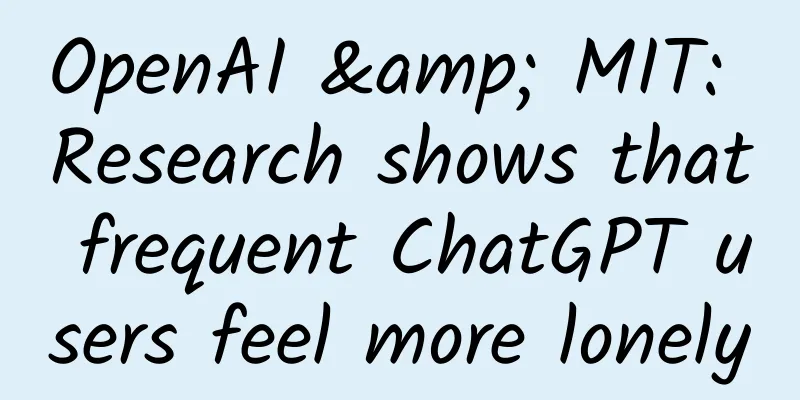OpenAI & MIT: Research shows that frequent ChatGPT users feel more lonely

|
Two studies conducted by OpenAI and MIT Media Lab found that a small number of test subjects who used ChatGPT extensively reported increased loneliness and emotional dependence, and decreased social interaction. In other words, the study shows that lonely people are more likely to seek emotional connection with an AI robot. This says a lot about how people approach relationships, how we are increasingly dependent on technology, and how we are integrating it deeply into more aspects of our lives than just completing tasks. This also raises the question of how we will interact with chatbots in the future and what impact this will have on us. A study conducted by the OpenAI team analyzed more than 4 million ChatGPT conversations from 4,076 participating users who voluntarily reported their feelings about the service. In another study, researchers at the MIT Media Lab had 981 people use ChatGPT for at least five minutes a day for four weeks. The researchers then surveyed the participants about their perceptions of ChatGPT, as well as their own loneliness and connectedness in the real world, the social interactions they participated in, and whether they saw any problems with using AI services. If you didn’t immediately realize this: OpenAI developed and sells ChatGPT. So, yes, this is a pretty self-aware move by the company to examine whether its product is having a negative impact on its target audience, and whether it can learn anything to prevent those effects from getting worse. From both studies (neither of which has yet to be peer-reviewed), the researchers found that most people don’t develop a deep emotional connection with ChatGPT, even for some of the most frequent users of its realistic advanced voice mode (where you can have a fairly natural back-and-forth conversation with the bot). The study found a modest correlation between using ChatGPT for “private” conversations and loneliness. At the same time, this type of use was associated with lower levels of emotional attachment. So it’s a bit of a mixed bag. As Casey Newton writes in his Platformer newsletter, it’s possible that “sufficiently compelling chatbots could pull people away from their relationships, potentially making them feel lonelier and more dependent on artificial companions whom they must pay to maintain contact.” Deeper, more specific research is needed to get a clearer picture of the impact on well-being of people’s continued use of such services. But some are already tapping into the human interest and need for connection, and AI companions offer a way to feel like you’re making a connection. This is not to say that AI chatbots are bad for us in every way. For some people, they can provide meaningful ways to ease loneliness and find ways to privately express and reflect on what they’re going through. However, the study suggests that platforms need to develop bots more responsibly, while being aware of how much energy people invest in connecting with them. At the same time, regulators need to develop frameworks that prevent companies from taking advantage of deeply engaged users and encourage companies that develop AI systems to actively prioritize the well-being of their audiences. |
Recommend
3 ways to play, 4 key points, revealing the operation routine of the big wheel lottery event
The roulette wheel lottery is one of the activity...
Mobile phone manufacturers become OEMs: not decline but another way out
Lenovo has just denied the news of returning to O...
3 strategies for native advertising!
Only by using fewer "tricks" can you tr...
When will the Beijing epidemic end completely in 2022? When will the lockdown be lifted and things return to normal? Attached the latest news
According to the recent number of newly confirmed ...
After eating hot pot for several days, the whole family went to the hospital! Doctors urgently remind
As the weather gets colder, hot pot has become a ...
How to place Xiaomi information flow? I summarized the 4-step method of creative optimization that affects CTR
Users are paying more and more attention to the e...
The competition for multi-core smartphones stalls, putting MediaTek at a disadvantage
As mobile phone hardware performance shows signs ...
Revealing the secrets of Siri, Apple publishes a paper explaining the design ideas of the voice assistant
Recently, Apple released a series of papers to ex...
Is it possible for "time travel" to become a reality? Don't worry, the premise is...
What is time? It seems to be the greatest mystery...
Scientific rumor-busting | The chemistry in fireworks and firecrackers
General Secretary Xi Jinping pointed out: "S...
What to do if your immunity is low? How to improve your immunity? Learn more in one article
It is said that only idiots catch colds in summer...
Detailed explanation of adapter mode and application scenarios of Android design pattern
[[417879]] Preface Design patterns are sometimes ...
A new way to earn over 10,000 yuan a month through self-media: use every possible means to make others copy you!
Those who work in self-media know that whether or...
Some people wear short sleeves, some wear cotton coats. How should we dress randomly when the seasons change?
Whenever the seasons change, people's dressin...
Honor Play 6X unboxing: dual-camera flagship rewrites the thousand-yuan phone landscape
With the continuous innovation of products, dual-...









